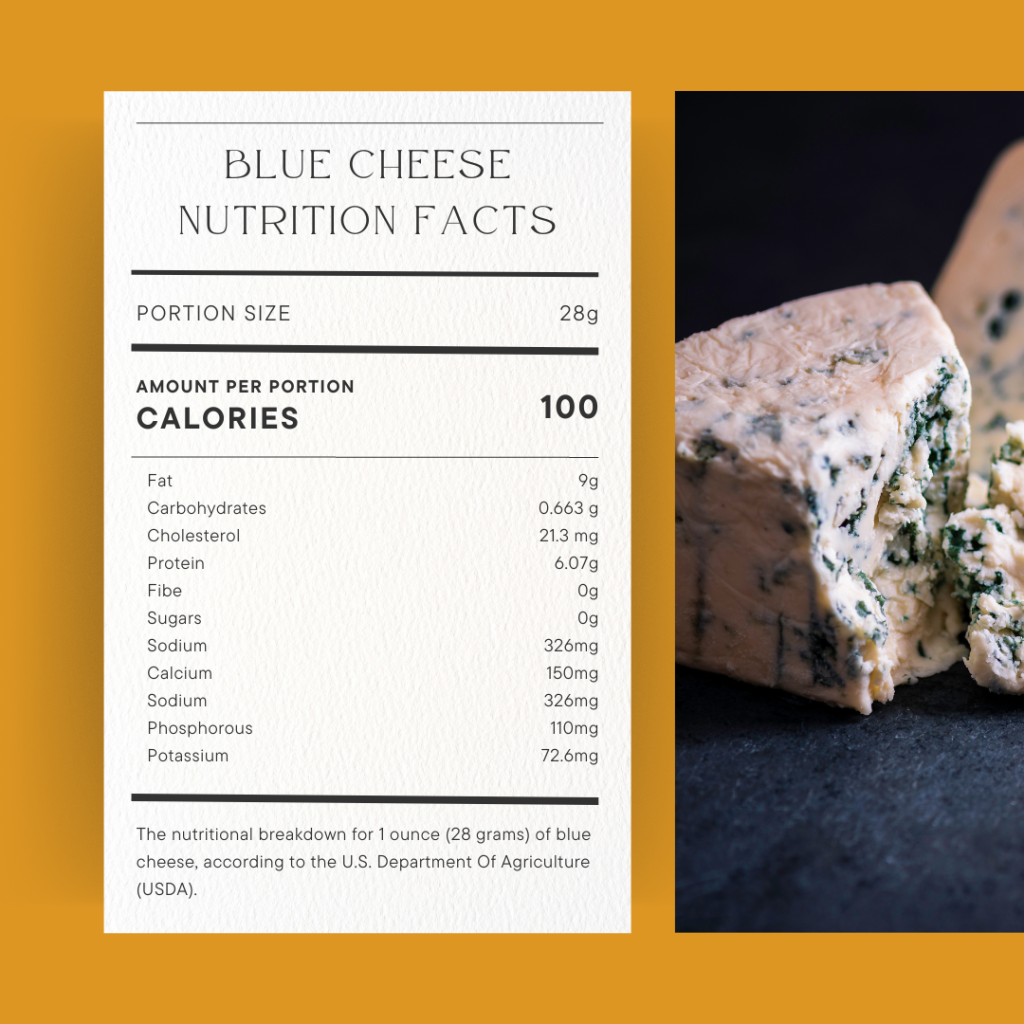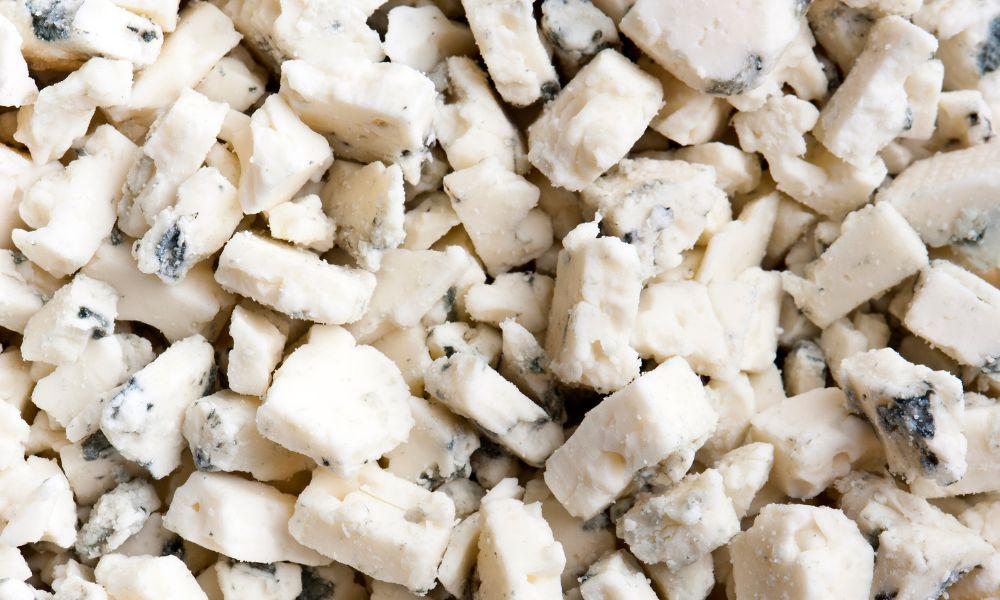Learn if you can freeze blue cheese to extend its shelf life, discover the best practices for storing blue cheese, how long it remains fresh, and indicators of spoilage.

Understanding Blue Cheese
Blue cheese is renowned for its pungent aroma and robust, salty flavor profile. Here’s a closer look at what makes it unique:
What Is Blue Cheese?
Blue cheese is crafted with Penicillium, a mold species that imparts its distinctive taste, aroma, and marbled appearance. Unlike some molds, Penicillium is non-toxic and entirely safe for consumption.
During the cheese-making process, Penicillium spores are added to the milk or curd. As the cheese ripens, usually over six months, bluish or greenish veins form, giving it its characteristic marble look.
Certain blue cheese varieties are matured in caves to leverage the stable conditions – a practice that enhances their flavor. Depending on the type and processing, blue cheese can either be creamy and soft or have a crumbly texture.

Freezing Blue Cheese: The Basics
Can you extend the life of your blue cheese by freezing it? Let’s find out.
Can You Freeze Blue Cheese?
“Can blue cheese be frozen?” is a question many cheese enthusiasts ask. The answer is a resounding yes. Freezing blue cheese is an optimal method to prolong its shelf life up to six months. Nonetheless, to savor its original taste, it’s advisable to consume it within two months of freezing. Post the two-month mark, there’s a noticeable dip in its taste, texture, and creamy richness.
👩🍳A Pro Tip: Once thawed, the milk fat in blue cheese alters in consistency, leading to a crumblier texture. It’s a good idea to use thawed blue cheese in soups and salads rather than on bread or crackers. Once you incorporate thawed blue cheese into recipes, you can freeze the resultant dishes for future consumption.
How To Freeze Blue Cheese
Blue cheese boasts a commendable shelf life. However, freezing it requires precision to retain its quality. Here’s a step-by-step guide:
- Preparation: Begin by checking the cheese’s expiry date. Plan how you intend to use the thawed cheese since its fresh taste might slightly diminish post-freezing.
- Segmentation: Slice, cube, or grate the cheese based on your future culinary needs. If a recipe demands crumbly blue cheese, store the wedge intact.
- Packaging: Double-wrap the cheese segments in plastic wrap or aluminum foil. This dual-layering protects against freezer burn and prevents cross-contamination.
- Storage: Place the wrapped cheese in freezer bags or airtight containers. Extract as much air as possible before sealing. For clarity, label each bag with the freezing date.
- Refrigeration: While freezing is a long-term solution, refrigeration is suitable for short-term storage. When well-wrapped and stored in airtight containers, blue cheese remains fresh for up to 4 weeks in the fridge.
Discover more about freezing cheeses in our guide on how to freeze American cheese.

Dealing With Blue Cheese Crumbles

Can You Freeze Blue Cheese Crumbles?
Absolutely! In fact, freezing crumbled blue cheese is quicker than dealing with slices or wedges. Divide the crumbles into manageable portions and use either the original container or individual freezer bags for storage. To prevent clumping, shake the crumbles post 30 minutes of freezing. Ideally, consume frozen crumbles within two months for the best flavor.
Thawing Blue Cheese the Right Way
How To Thaw Blue Cheese
Thawing blue cheese demands patience. For slices, a few hours in the refrigerator suffices. However, a larger cheese wheel might need an entire day. Always thaw in the fridge to deter bacterial growth. Alternatively, introduce frozen blue cheese directly into oven or stovetop recipes without prior thawing.
Recognizing Spoiled Blue Cheese
Given its moldy nature, determining when blue cheese has truly gone bad can be tricky. Here’s how:

- Odor: If your blue cheese exudes an ammonia-like smell, it’s time to let it go.
- Appearance: Monitor the beige or white segments of the cheese. Any brown or green discoloration signals spoilage.
Expert Tips On Storing Blue Cheese

- Source the freshest blue cheese with an extended shelf life to ensure longer freezing durations.
- Always verify the best-before date. Freezing won’t rectify an already expired cheese.
- Avoid refreezing once thawed to maintain taste and texture.
- Implement a double-wrap approach to guard against freezer burns.
- For optimal flavor post-defrosting, incorporate blue cheese into cooked dishes rather than serving it raw.
- Given the active mold spores in blue cheese, ensure its isolation in the fridge or freezer to prevent cross-contamination with other foods.
- Some cheese connoisseurs advocate that blue cheese should “breathe”. Hence, they suggest storing it in containers with slightly ajar lids. However, vacuum sealing is discouraged due to the anaerobic bacteria present in blue cheese.
Conclusion
Now that you’re equipped with a thorough understanding of freezing blue cheese, you can easily store and enjoy its unique taste for months. Whether you’re incorporating it into a dish or savoring it as is, this guide will ensure you get the most out of your blue cheese. For other cheese varieties and their storage tips, check our guide on how to freeze American cheese.
FAQs
What are the health benefits of blue cheese?
Blue cheese is a rich source of calcium, protein, and probiotics. These contribute to bone health, muscle development, and a balanced gut biome. Moreover, specific compounds in blue cheese might ward off cardiovascular diseases.
How to best pair blue cheese?
Blue cheese pairs exquisitely with figs, honey, dark chocolate, and wines like Cabernet Sauvignon or Port. Such combinations elevate the cheese’s taste profile.
Can You Freeze Danish Blue Cheese?
If you freeze soft blue cheese like Danablu Danish blue cheese, its texture and taste will change but yes, you can freeze it.






